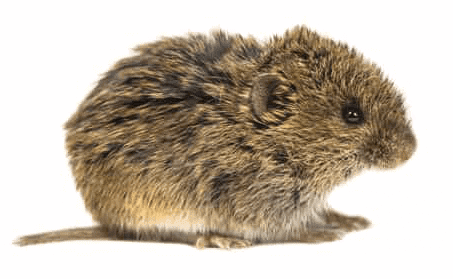Comprehensive Insect Control Provider to Battle Vole Infestations
Vole problems can swiftly intensify, creating damage to gardens, landscapes, and grass. The impact of these small rodents can be substantial and speedy, requiring a thorough pest control technique to successfully take care of the scenario. Understanding the behavior and biology of voles is important in designing an integrated approach that not only attends to the existing infestation however also stops future events. By using a mix of recognition, exemption, capturing, and habitat adjustment strategies, specialist pest control services can use a customized remedy to combat vole problems. The crucial lies in carrying out a well-shaped strategy that not just gets rid of existing voles however likewise establishes long-term control steps to protect against future invasions.
Vole Recognition and Examination
When examining for voles, look for their particular paths, burrow openings, and nibbled plant origins. Nibbled plant origins are one more sign of vole task, suggesting their existence and possible damage to plant life. By precisely recognizing these signs, insect control professionals can tailor their approaches to effectively take care of vole invasions and shield yards and yards from additional damage.

Trapping and Elimination Methods
Effective bug control techniques for managing vole invasions typically entail utilizing specialized trapping and removal methods. Trapping is an extensively utilized approach to record voles and transfer them far from homes. Live traps, such as box catches or tube traps, are typically utilized as they permit the risk-free capture of voles without triggering injury. These catches are strategically positioned in vole paths or near burrow entryways to boost the possibilities of successful capture.
When establishing up traps, it is essential to ensure they are put correctly and baited with vole-preferred food sources like peanut butter, seeds, or fruits. Regularly checking the traps is important to quickly eliminate caught voles and stop distress or damage to the animals. When caught, voles ought to be moved to appropriate habitats far from human residences to avoid re-infestation.
Furthermore, exemption strategies, such as mounting obstacles or secure fencing underground, can aid prevent voles from accessing certain areas. Proper disposal of captured voles and consistent surveillance of vole task are necessary elements of an effective trapping and elimination approach in vole problem administration.
Exclusion and Barrier Approaches

By addressing these vulnerabilities and applying targeted exemption and barrier measures, building owners can considerably lower the risk of vole invasions. Ultimately, a combination of capturing, elimination, and aggressive exemption actions can aid efficiently handle vole populaces and shield properties from infestations.
Environment Modification and Prevention
To mitigate vole infestations, habitat modification and avoidance strategies concentrate on altering the environment to dissuade vole habitation. One reliable approach is lowering the schedule of food sources by keeping grass cut short, eliminating weeds and debris, and keeping a neat lawn. Voles are attracted to locations with dense vegetation and mess, so producing open spaces can aid prevent them from clearing up in the area. In addition, lowering excess wetness by fixing dripping pipes, guaranteeing proper drainage, and removing standing water can make the setting much less friendly for voles.
Incorporating barriers like crushed rock borders or cord mesh visit their website underground can also protect against voles from tunneling into lawns or gardens. These physical obstacles disrupt their ability to passage and accessibility wanted locations. Planting vole-resistant vegetation and making use of vole-repellent strategies such as castor oil-based deterrents can additionally prevent vole activity. By executing these habitat modifications and prevention measures, homeowner can proactively minimize the risk of vole invasions and protect their exterior spaces from damages. vole control utah county.
Surveillance and Follow-Up Strategies

Follow-up techniques involve revisiting the treated areas to look for any type of indications of vole task. Monitoring stations, traps, and visual examinations are frequently made use of approaches to evaluate the success of the bug control actions. By consistently inspecting these areas, bug control professionals can rapidly identify any kind of resurgence of vole task and take aggressive actions to resolve the concern prior to it rises.
In addition, recording the results of monitoring and follow-up activities is vital for tracking the progress of vole infestation control in time. These records help in identifying fads, evaluating the performance of different control approaches, and making educated choices for future insect administration methods. Normal follow-up procedures not only aid in stopping vole re-infestations but likewise add to the general success of pest control efforts.
Verdict
To conclude, comprehensive bug my sources control solutions are crucial for successfully combating vole infestations. By recognizing and inspecting vole populations, implementing capturing and elimination techniques, making use of exclusion and obstacle techniques, modifying habitats, and implementing surveillance and follow-up approaches, property proprietors can effectively take care of and avoid future problems. It is vital to address vole problems promptly to prevent damage to residential property and prospective wellness dangers.
By utilizing a combination of recognition, exemption, environment, and trapping alteration strategies, professional pest control solutions can use a customized remedy to battle vole problems (vole control utah county). By properly recognizing these indications, insect control specialists can customize their techniques to efficiently take care of vole infestations and protect yards and backyards from additional damage
Efficient pest control techniques for managing vole invasions usually involve using specialized trapping and removal methods.To alleviate vole problems, habitat alteration and avoidance strategies focus on modifying the atmosphere to dissuade vole habitation.Normal tracking and follow-up treatments are crucial in preserving vole infestation control measures and making sure lasting success in insect advice administration.